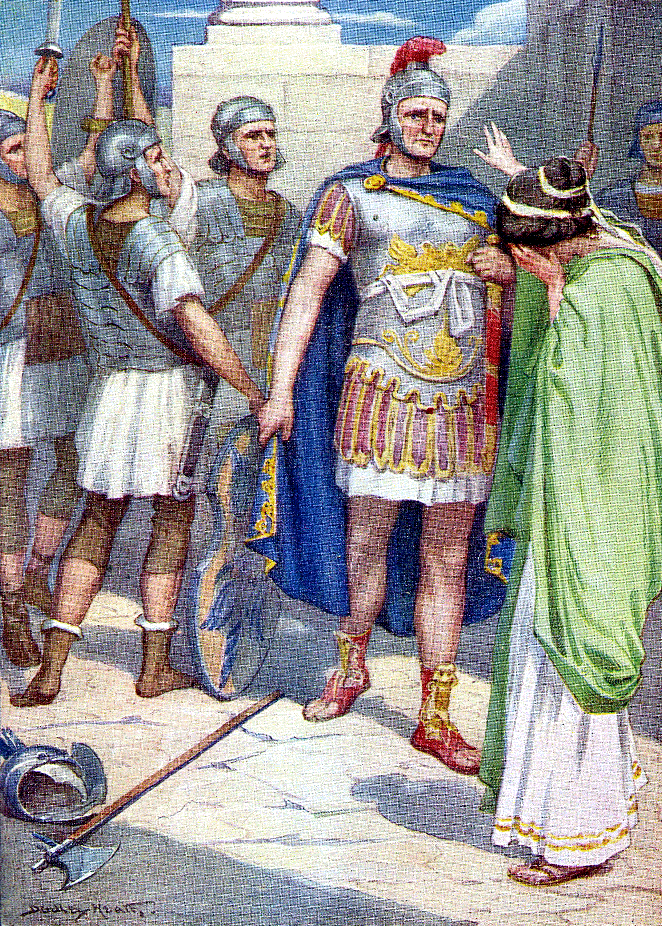Story of Rome - Mary Macgregor |
Horatius Slays His Sister
Tullus Hostilius, the king who succeeded Numa Pompilius in 672 B.C., loved war as much as Pompilius had loved peace.
He feared lest already the Romans had lost the renown that had been theirs on the battlefield when Romulus was king. So he determined to find a pretext for war as soon as possible, that his soldiers might show that courage was still theirs, and that their fame might spread as of old to the neighbouring tribes.
Such was the warlike character of Tullus Hostilius, that it was soon found necessary to throw wide the gates of the temple Janus.
It chanced that shortly after the new king came to the throne some Roman and Alban countrymen quarrelled, each saying that he had been robbed by the other.
Tullus at once took the side of his own people, sending to the King of Alba to demand that the goods which had been stolen should be restored. The King of Alba at the same time sent messengers to Tullus, claiming that justice should be meted out to those who had robbed his subjects.
The King of Rome received the messengers from Alba so courteously and treated them so well, that they forgot the errand on which they had been sent, until startled by the return of the Roman ambassadors.
They, having been refused justice by the King of Alba, had, ere they left, declared that the Romans would avenge the wrong done to their countrymen.
Tullus was well pleased with the report of his ambassadors. He sent away the careless messengers of Alba, bidding them tell their king that it was he who had provoked the war.
The two kings speedily collected their armies and marched to the battlefield. But before the war began the King of Alba died. Then the Albans chose one of their number, named Mettius, to be Dictator.
He, standing between the two armies, begged that the victory might be decided by single combat, so that many lives might be spared.
To this Tullus agreed, sending forth as the Roman champions three brothers, called the Horatii, while the choice of Mettius fell upon three Alban brothers, named the Curiatii.
A great silence fell upon the two armies as the combatants stood forth, armed to the teeth, and the contest which was to settle the fate of Rome and Alba began.
Should the Horatii win, Rome would seize Alba as its prize. Should the Curiatii be the victors, Rome would be forfeit to the Albans.
Fierce and yet more fierce fell the blows of the champions, until at length, two of the Horatii lay slain on the ground, while the three Curiatii were wounded.
Then, to the dismay of the Roman army, Horatius, on whose courage the safety of Rome depended, turned and fled, pursued by the three wounded men.
But the Romans need not have feared that Horatius had turned coward. His flight, as they soon saw, was but a feint to separate his enemies.
As the swiftest of the Curiatii gained upon him, the Roman champion turned and smote him to the ground. Without a moment's pause Horatius then attacked the second brother, who had now reached his side, and he also fell before the fury of the Roman's stroke. The last of the Curiatii had been forced to follow more slowly, as his wounds had been severe. He, too, was now stricken down by the conqueror.
Rome was saved! At the thought great shouts rent the air, and Horatius was led in triumph toward the city.
As the glad procession drew near to the gate, the sister of Horatius came out to meet her brother. She was the promised bride of one of the Curiatii.
When she saw Horatius, wearing on his shoulders the cloak of her betrothed, which she herself had embroidered, she broke into bitter sobs and began to curse him for his cruel deed.
 When she saw Horatius wearing on his shoulders the cloak of her betrothed, she broke into bitter sobs. |
Then Horatius, in sudden passion, drew his sword and stabbed his sister, crying: 'So perish the Roman maiden who shall weep for her country's enemy.'
Great was the service Horatius had done for Rome that day, yet his rash act could not be allowed to pass unpunished. He was taken prisoner, and brought before two judges, who condemned him to death.
But Horatius refused to submit to his sentence, and appealed to the people of Rome to save him. And for the sake of his old father, who had already that day lost two sons, as well as because he himself had risked his life for his country, the people listened to his plea and set him free.
Yet, as a public penance, he was obliged to pass beneath a yoke and offer sacrifices to the spirit of the sister he had slain.
The yoke under which Horatius had to pass was formed of two beams of wood which were thrust into the ground, and across the top of which a third beam was placed. Sometimes the yoke was made by using three swords in this way.
But it was a wooden yoke under which Horatius stooped, and one of the beams was treasured for many years, and named the 'sister's beam.'
Yet it was not only the memory of his penance that was preserved. To recall his courage to the Romans who would follow him, the arms which Horatius had taken from the Curiatii were hung on a pillar in the market-place. And in days to come the citizens would point to this pillar, saying: 'It is the pillar of Horatius.'